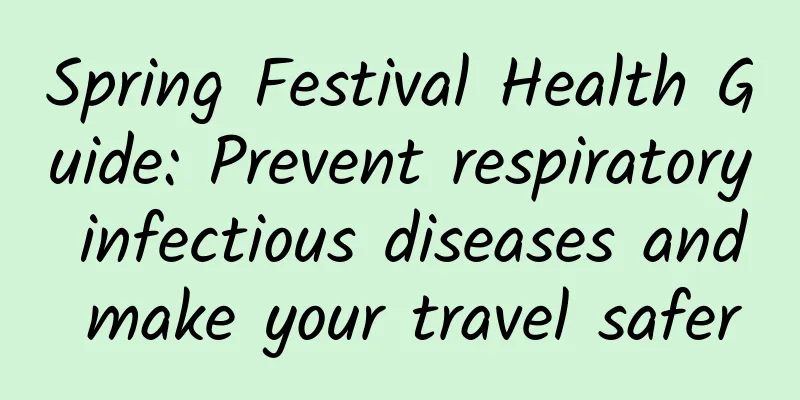Spring Festival Health Guide: Prevent respiratory infectious diseases and make your travel safer

|
Editor's note: Recently, Guangming Online's Science Channel and the "Dayi Xiaohu" medical communication think tank launched a special topic called "Winter Respiratory Disease Series Popular Science Interpretations", inviting medical experts to provide popular science interpretations on the causes, transmission routes, prevention measures and treatments of respiratory diseases. Please pay attention. Author: Chen Liu, Fu Li, Department of Pediatrics, Xuhui Hospital, Zhongshan Hospital Affiliated to Fudan University Scientific review: Shen Jian, Yueyang Hospital of Integrated Traditional Chinese and Western Medicine, Shanghai University of Traditional Chinese Medicine As the Spring Festival is approaching, passenger traffic is surging in various places. The year-end migration of Chinese people is about to come. People go home to visit relatives and go out to travel. With the exchange of people from the southeast, northwest, and northeast, pathogens from various places (such as viruses, bacteria, Mycoplasma pneumoniae, etc.) are also happily participating in this great exchange of east, west, south, and north. With the increase in the chances of contact and interaction among people traveling, the risk of contracting respiratory infectious diseases will also increase significantly. Therefore, it is recommended that family members, especially those traveling with children and/or the elderly, must understand the following knowledge before going out. Understand respiratory infectious diseases and take personal protection. Have a healthy and happy holiday. What are respiratory infections? Respiratory infectious diseases are contagious diseases that can be caused by viruses, bacteria, Mycoplasma pneumoniae, Chlamydia, etc., and can be transmitted through a variety of ways. Some people have relatively mild symptoms and can recover without further medical intervention. However, for those with weaker immunity, older age, and those with underlying diseases, they are more likely to cause more serious consequences. How are respiratory infections spread? Respiratory infectious diseases are mainly transmitted through droplets, and can also be transmitted through objects contaminated by pathogens, such as food, water, clothing, etc. The Spring Festival travel rush is the largest migration of the year. Airplanes, high-speed trains, trains, and buses all have one thing in common: small spaces and dense crowds, which facilitate the spread of pathogens. Therefore, effective protective measures need to be taken to ensure your health. What preparations should you make before departure? Please prepare necessary protective equipment, such as masks, hand sanitizer, and alcohol-containing wet wipes. If you are traveling with children, it is best to prepare some antipyretics. For people with chronic diseases, you should bring enough medicines you need before traveling to avoid acute attacks caused by stopping medication without reason. It is currently the peak season for influenza, so you can prepare some influenza antigen detection reagents. What should you pay attention to when traveling by public transportation? In enclosed spaces on public transportation, it is recommended to wear a mask correctly. Be sure to wash your hands before eating (you can use hand sanitizer). If you use a small dining table on public transportation, wipe the table with alcohol wipes before placing food on the table. What should I do if I have a fever while traveling? If the child's temperature does not exceed 38.5°C, physical cooling can be used, such as wearing less clothes or unwrapping the blanket (as long as the child does not feel cold), drinking more water, wiping the body with warm water, etc.; or using ice patches. If the temperature exceeds 38.5°C, take some antipyretics, because children will feel uncomfortable if the temperature is too high. If the mental state and appetite are normal, you can first use some cold medicine and observe for 2-3 days. If there is no improvement, you can go to the local hospital for treatment. How to choose antipyretic medicine? The main antipyretic drugs for children are ibuprofen, acetaminophen, and some Chinese herbal medicines with anti-inflammatory effects. You should see a doctor immediately if you have any of the following: The high fever persists, the mental state is not good, always wanting to sleep, not wanting to eat, frequent vomiting, convulsions, shortness of breath and difficulty breathing, etc. Special reminder: If you are sick, do not travel, because long distances can make the disease worse, and if you meet someone with the same disease, you may be cross-infected; if you must go out and take public transportation, remember to wear a mask and be careful not to eat with other people, especially the elderly and children. Remember to carry a set of children's clothes with you to avoid vomiting or other reasons that require timely replacement of clothes. |
<<: Different soups for different body types, choose the right medicinal recipe for your condition
>>: Can patients with high blood pressure exercise? Please don’t do these three types of exercise!
Recommend
Why do my heels hurt after the confinement period?
When a woman is in confinement, her whole body is...
Life tips to treat gynecological inflammation
Many women suffer from a series of gynecological ...
Can I have sex when I am just one month pregnant?
When one month into the pregnancy, some pregnant ...
Is it good for women to have a normal IUD?
The IUD is a contraceptive ring that is implanted...
Will pubic hair grow back after being cut?
Pubic hair actually has a certain protective effe...
What is the most effective food for blood deficiency
Qi deficiency and blood deficiency are not uncomm...
Do frogs have a spine? How do frogs breathe?
Frogs belong to the phylum Chordata, class Amphib...
If you feel uncomfortable, please put down your phone! These messages are silently causing harm丨World Mental Health Day
Content planning and review: Li Bin Beijing Union...
What causes thigh heel pain?
Many people usually experience pain in the groin ...
How many hours after drinking rice wine should you breastfeed?
Pregnant women will have poor breast milk product...
What is the reason for blood clots in urine?
Normal urine is light yellow. If the urine has an...
Can I eat longli fish during menstruation?
Women during menstruation need to supplement prot...
An 8-month-old pregnant woman has gastroenteritis
Pregnant women really cannot afford to get sick, ...
What does NTD risk mean?
What does Down syndrome screening NTD mean? Metho...
What to do if you have protein in your urine during late pregnancy
Various symptoms may appear in the late pregnancy...









